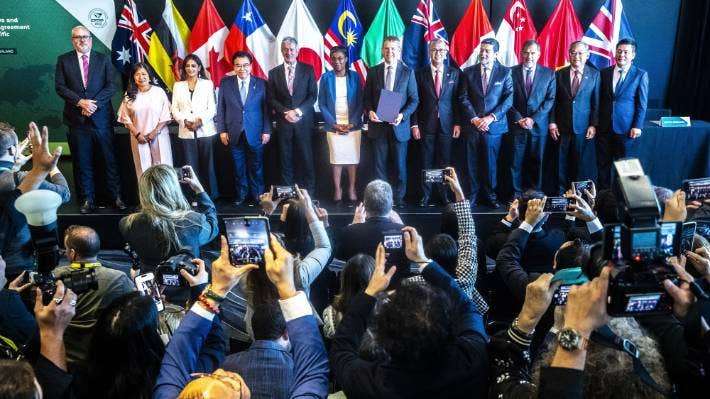In an effort to overpower the emerging strength of China in Asia and the Asian pacific nations, some of the world’s economic powers have adopted a new strategy of strengthening their relations with countries in Asia pacific.
The UK announced that, it has agreed to join the Comprehensive and Progressive Agreement for Trans-Pacific Partnership, after its Trade and Business Secretary signed a pact with the organization yesterday.
The Comprehensive and Progressive Agreement for Trans-Pacific Partnership (CPTPP) is a trade agreement signed among Australia, Brunei, Canada, Chile, Japan, Malaysia, Mexico, New Zealand, Peru, Singapore, and Vietnam.

These countries together, account for 13% of global income. Signing on to their trade union, the UK will be the organization’s second-largest economy after Japan, and would be the first non-founding member to join. UK’s inclusion, has jumped the organization’s value to £11 trillion, covering over 500 million people among member nations.
Kemi Badenoch, the Trade and Business Secretary rendered her defense to the trade pact, insisting that, the full impact of the new pact would only be felt on the UK economy, if the country successfully utilize every bit of clauses in the deal.
Moreover, the Trade Secretary insisted that, the trade deal will bring additional gains to the economy of UK, claiming that, the important issue on the side of UK, is how institutions, firms and businesses in the country “utilize the agreement.”

One founding principle of the CPTPP trade pact is that, restrictions involving trade among member nations become flexible, and tariffs charged in a form of border taxes, are lessen. The UK hopes to take huge advantage of reducing tariffs, that are paid on the export of meat products, cars, gin and whisky to these member nations.
Despite joining the trade bloc, the estimations by experts, and that of the government, shows that, the deal will only add 0.08% to the economy of UK in the next 10 years.
Previously, the Office for Budget Responsibility (OBR), which makes estimates for the government, claimed that Brexit would over time lower the UK’s capacity for economic expansion by roughly 4%.
The government’s estimate of the CPTPP’s effects, according to Ms. Badenoch, “doesn’t look at the future growth that’s coming in and it also doesn’t look at how we utilize the agreement. If we don’t use it, then it’ll become a self-fulfilling prophecy,” Mrs Badenoch said.

Mrs Badenoch added that, joining the organization comes with “so much potential.”
“This is the fastest growing region. The Asia Pacific is going to be responsible for at least 50% of global growth that we’re expecting between now and 2035.”
Mrs Kemi Badenoch, Trade and Business Secretary of UK.
The British government expounded that, over 400,000 people were employed by CPTPP-owned companies across UK, when it officially assented to the pact. According to the report, CPTPP firms “punch above their weight economically,” because they only make up 0.3% of all UK enterprises but produce 6.1% of the country’s overall revenue.
The arrangement, according to business advocacy organization the British Chambers of Commerce (BCC), is “good news for UK businesses to enter or upscale their trade in these markets.”
“We see particular relevance for small and medium-sized businesses in reduced costs to import components from member countries to use in manufactured goods for export.”
William Bain, Head of Trade Policy, British Chamber of Commerce.

On the other hand, trade and labour groups in the UK have raised concerns about the trade deal. The General Secretary of the Trade Union Congress in UK, Paul Nowak instigated that, the trade agreement “was bad for workers at home and abroad.”
“Once again, Conservative ministers have turned a blind eye to egregious human and workers’ rights abuses in their pursuit of trade deals.”
Paul Nowak, General Secretary of TUC, UK.
READ ALSO:Supermarket Food Prices Shot Up By 25% In Two Years




















